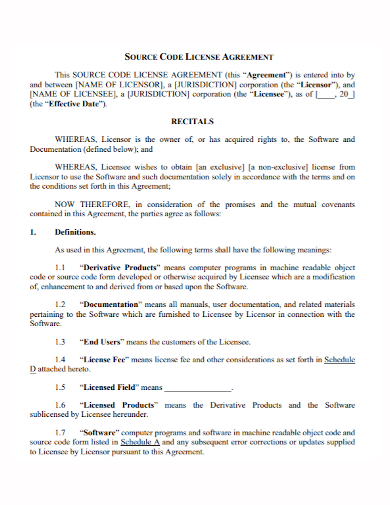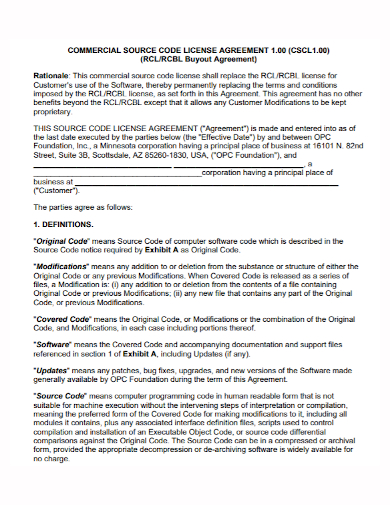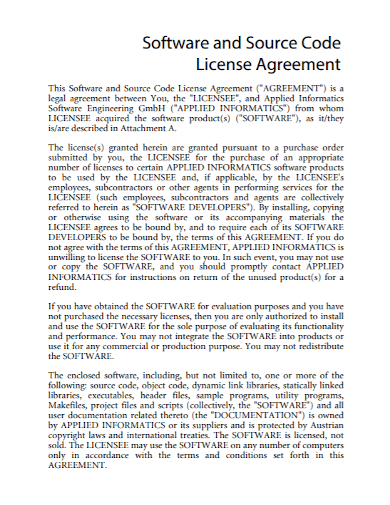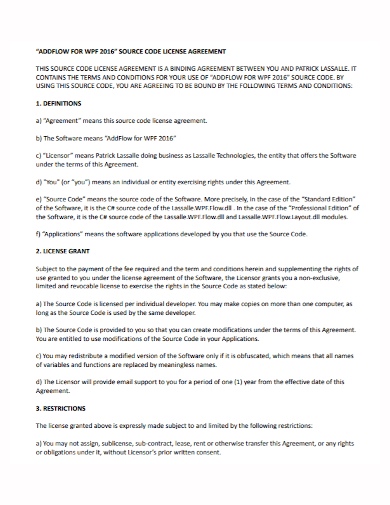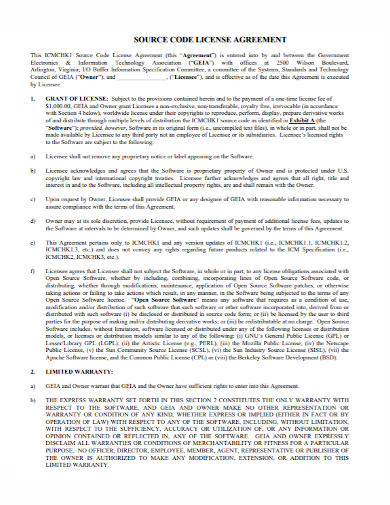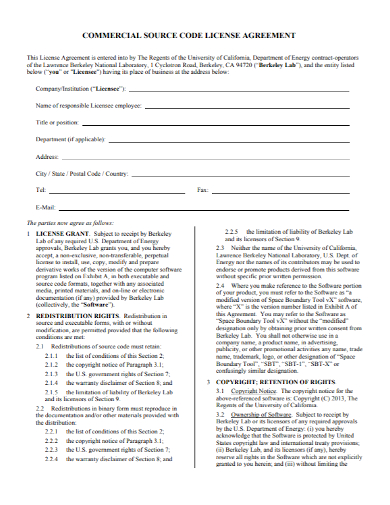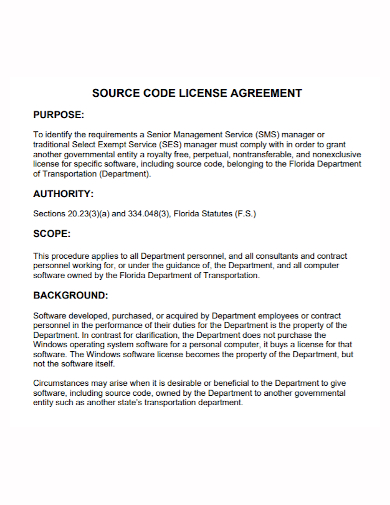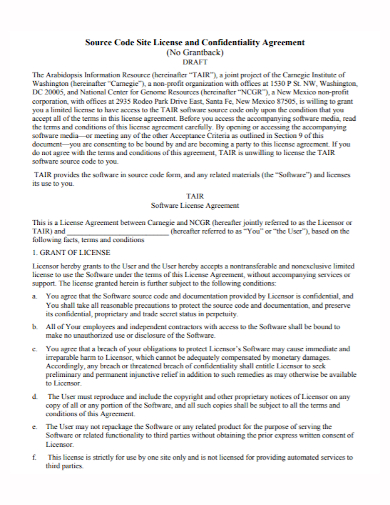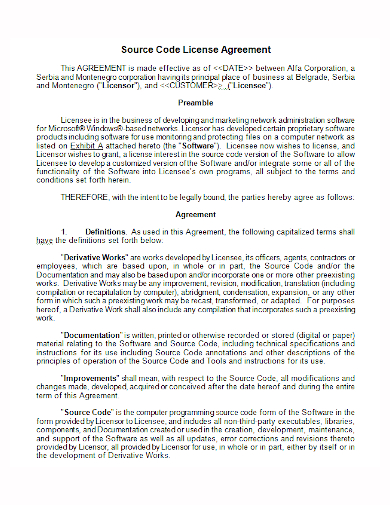There are two main types of source code licenses: open-source exclusive licenses and proprietary licenses. Open-source licenses, such as the MIT License or the GNU General Public License, allow for free use, modification, and distribution of the source code. These licenses often include a disclaimer of liability agreement and a requirement that the original copyright assignment notice is included in any derivative works.
9+ Source Code License Agreement Samples
1. Source Code License Agreement Template
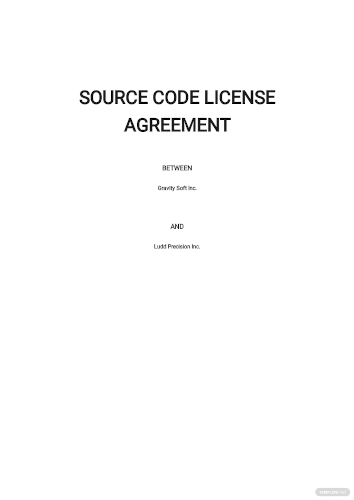
2. Source Code License Agreement
3. Commercial Source Code License Agreement
4. Software Source Code License Agreement
5. Addflow Source Code License Agreement
6. Source Code Grant License Agreement
7. Sample Source Code License Agreement
8. Standard Source Code License Agreement
9. Source Code Site License Confidentiality Agreement
10. Editable Source Code License Agreement
What Is a Source Code License Agreement?
A source code license is a legal agreement that specifies the terms and conditions under which the source code of a software program can be used, modified, and distributed. Some common types of source code licenses include open-source licenses (such as the MIT License or the GNU General Public License) and proprietary licenses (such as a license from a software company that only allows the use of the source code under specific conditions). The license typically includes information on copyright and ownership, as well as any limitations or restrictions on the use of the code.
How to Make a Source Code License Agreement
One of the main benefits of open-source licenses is that they promote collaboration and innovation within the software development community. Because the source code is freely available, developers can easily share their modifications and improvements with others. This can lead to faster development and the creation of better software. Additionally, open-source licenses often include a disclaimer of liability, which can provide a degree of protection for developers who use the code in their own projects. So, get started, follow the steps below:
Step 1: Choose a License
The first step in creating a source code license agreement is to choose a license that best suits your needs. There are many different digital content licenses to choose from, such as the MIT License, the GNU General Public License (GPL), and the Apache License. Each license has its own set of terms and conditions, so be sure to choose one that aligns with your goals for the software.
Step 2: Include a Notice Statement
Include a statement in the license agreement that establishes your ownership of the copyright for the source code. This notice should include your name and the date the code was created. Clearly define the terms and conditions under which the source code may be used, modified, and distributed. This may include any limitations or restrictions on usage.
Step 3: Write a Disclaimer
Many open-source licenses include a disclaimer of liability that releases the copyright holder from any responsibility for any damages resulting from the use of the code. Many open-source licenses require that any derivative works include a reference to the original source code and the license under which it is released.
Step 4: Provide Instructions
Specify how the source code may be distributed, including any restrictions or requirements for distribution. Review the license agreement for accuracy and completeness, and make any necessary changes. Once the agreement is finalized, it should be included with the source code, and it should be clearly visible to anyone who accesses the code.
FAQs
What are the different types of source code licenses?
The two main types of source code licenses are open-source licenses and proprietary licenses. Open-source licenses, such as the MIT License or the GNU General Public License, allow for free use, modification, and distribution of the source code. Proprietary licenses, on the other hand, are typically issued by software companies and only allow the use of the source code under specific conditions.
What should be included in a source code license agreement?
A source code license agreement should include a copyright notice, terms of use, a disclaimer of liability, an attribution requirement, and instructions for distribution. It should also specify any limitations or restrictions on the use of the code.
Is it necessary to have a lawyer review a source code license agreement?
It is highly recommended to have a lawyer with experience in intellectual property and software development review your source code license agreement to ensure that it is legally compliant and covers everything you need.
In conclusion, source code licenses are an important aspect of software development and distribution. They provide a means for software developers and companies to protect their intellectual property, while also allowing for the collaboration and innovation that is necessary for the continued advancement of the software industry. Whether open-source or proprietary, licenses should be well understood by anyone who plans to use, modify, or distribute software source code.
Related Posts
Agreement Format
Teacher Agreement Contract Samples & Templates
Car Rental Agreement Samples & Templates
Vehicle Sales Agreement Samples & Templates
FREE 10+ Sample Indemnification Agreement Templates in PDF
FREE 10+ Fundraising Agreement Samples in MS Word | Pages | Google Docs | PDF
FREE 10+ Co-Branding Agreement Samples [ Partnership, License, Product ]
FREE 8+ Independent Agreement Templates in PDF | MS Word
FREE 11+ Sample Event Contract Agreement Templates in PDF | MS Word | Google Docs | Pages | Excel
FREE 26+ Investment Agreement Samples in PDF | MS Word | Google Docs | Pages
Land Purchase Agreement Samples & Templates
Sample Business Agreement between Two Parties
FREE 10+ Trial Agreement Samples In MS Word | Google Docs | Apple Pages | PDF
FREE 10+ Charter Agreement Samples In MS Word | Google Docs | Apple Pages | PDF
FREE 10+ Mentoring Agreement Samples In MS Word | Apple Pages | PDF

